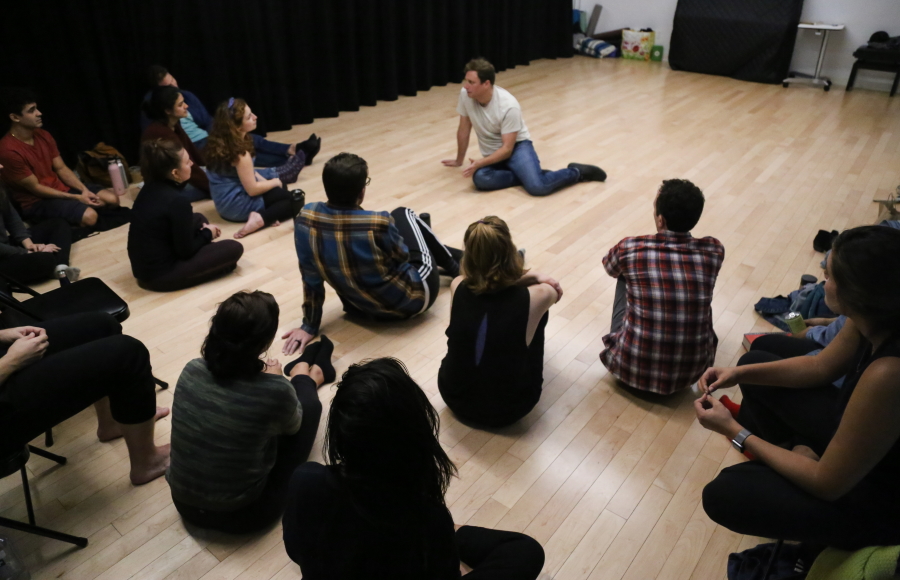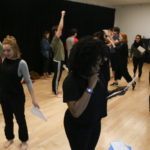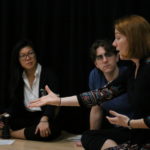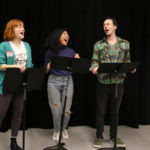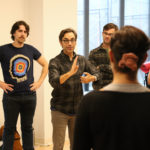New York City-based Fiasco Theater is known for its rollicking adaptations of Shakespeare and inventive takes on musicals. The company, which comprises graduates of the Brown University/Trinity Repertory Company MFA acting program, burst on the scene in 2011 with a playful, hoedown-inspired Cymbeline. And Fiasco’s most recent project, Merrily We Roll Along at Roundabout Theatre Company, was a spirited take on Stephen Sondheim’s rarely produced tuner.
The company is driven by text analysis, active engagement in the rehearsal room, and collaboration, which can bring fresh life to hard-to-crack Shakespeare “problem” plays, among other works. Now Fiasco has codified their ensemble-based approach to performance—and the arduous rehearsal process behind it—into a training program. For the past few years, company members have offered a free three-week training initiative. This past fall, Fiasco launched a six-week paid conservatory program outlining the tenets of their work.
The inaugural cohort, dubbed 6WC (6-week conservatory), took up residence at Sunlight Studios in Manhattan for the full Fiasco treatment. Many of the 16 selected students came to the program after having seen Fiasco’s work; some had already participated in the company’s free training initiative, and others used this experience as a testing ground for whether or not to pursue an MFA program.
The holistic, jam-packed conservatory program joins the company of just a handful of similar programs in New York City (HB Studio’s Hagen Summer Institute, the William Esper Studio’s summer intensive, and T. Schreiber Studio for Theatre & Film’s summer conservatory). The company, which raised money to support scholarships for the conservatory, says they’re dedicated to making training affordable. The six-week program, with day-long classes Monday through Friday, runs a total of $3,500. While there are a number of studios in the city, many decades old, few offer the chance for performers to collaborate with an active ensemble, and there are even fewer opportunities to dive deep into the rehearsal process. In most foundational acting courses, students are assigned scene work to perform in class.
“You go home and then memorize your lines and rehearse with your partner, and then you come in and show your scene to an acting teacher, who then gives you feedback on the performance of the scene,” said Fiasco co-artistic director Noah Brody. “For us, that seems to be skipping the whole game. What’s most interesting is the process. What happens when you first meet the text? What does your first rehearsal look like with your fellow actors?”
Actors, no matter what stage they’re at in their career, need a space to answer those questions. “They need a place to come flex muscles and fail, and to learn how to get better,” said Fiasco co-artistic director Jessie Austrian. “And you kind of can’t do that alone in your apartment. You need other people, an ensemble, and you need to learn by watching others.”
She added: “The thing that makes us unique is that we teach rehearsal. That’s what we work on. That’s how we make our plays—actors and directors together rehearsing in a room.”
So how is rehearsal taught? The 6WC conservatory curriculum includes courses on prose, verse, and clown work, as well as breath and movement. “Classes are not simply individual pieces, but they come together in a cumulative whole,” said student Jason Cohen. “Which was so vastly different from my undergrad experience.”
6WC sets out to find the tools needed for table work, discover how to physicalize around the table, and build a creative process for working when the table disappears. “In six weeks the idea is not to achieve mastery, but to get introduced to ideas, principles, and ways of working that can continue to be developed,” said Brody.
To get a better sense of the program, I joined the 16 participants at Sunlight Studios at the start of the conservatory program and in its final week. I observed students tackle verse, parse prose, and create playful, red-nosed characters—I even accidentally became a scene partner when I walked in mid-presentation of clown class.
The athleticism on display in Fiasco’s performances stems from the games played in the rehearsal room. Working through the dialogue of a scene is indeed a workout. “There’s this delicious tennis match of wit,” remarked Jessie Austrian in her prose class as two actors portraying Viola and Feste volleyed text back and forth, raising their hands when delivering polysyllabic words. “When you let the rhythm help you, we hear things out here.”
The physicality in Zachary Fine’s clown class dovetails with the conservatory’s concentration on Shakespeare. “Clown work is so much a part of Shakespeare’s work, this course is just a natural fit,” said Fine. “Theatre is about adults playing pretend, so we need to remind our bodies that we like to play games.”
In co-artistic director Ben Steinfeld’s verse class, I witnessed the sense of teamwork and sportsmanship that is part of the Fiasco ethos. When two actors struggled through a scene, the observing students became a cheering squad, chanting in unison “We like you, we like you, you’re great, you’re great!”
That’s the kind of camaraderie and support that many undergraduate and graduate acting programs, rife with competition, can be sorely lacking. “It’s the idea that everyone is part of the process,” said student Michael Sweeney Hammond. “The two people acting, the teacher, and the 14 of us. We’re all going to grow by supporting each other. It fosters a nice energy.”
The synergy stems from the Fiasco company’s training experience at Brown University/Trinity Rep, where the teachers performed alongside students. “There was this wonderful sort of chorus back and forth of the teachers practicing what they preach,” recalled Austrian.
Coming full circle, the movement and breath work in 6WC is taught by Fiasco’s own teacher from Brown, Annie Piper. “There is such a spirit of generosity in this training and gratitude for the work,” she told me about 6WC. Piper led a weekly class integrating yoga and Qigong, which “helped them get their bodies, breath, heart and minds in the space, and helped them to be present in their work.”
Sure, there is rigorous text analysis work and interrogation of the material that is part of any good rehearsal. But Fiasco brings another element to the rehearsal room: joy. In fact, “joyful” is even written into the company’s mission statement.
“If you’re focusing on joy, that will lead you to a more authentic experience,” said Sweeney Hammond. “You will never feel lost in a room or on a stage if you continually give yourself permission to try and pursue your joy.”
Fiasco’s joy, plus a little bit of magic, Fine said, permeated the 6WC group. “It really rippled its way through this company of actors and it created a really exciting room.”
From the second week to the sixth, as an outsider I witnessed the group of strangers meld into a cohesive unit. On the final week, a whiteboard hung on the studio wall with 6WC and a heart scribbled next to it. There was a lot of joy in the room.
“It’s amazing how far everyone has come, and I haven’t even seen you in many of your other classes,” said Steinfeld at his final class. “But just what you’ve done in here alone in six weeks, meeting only twice a week, is bananas. That has been remarkable to behold…I’m delighted with the growth that you’ve all displayed in here.”
The students didn’t want to leave the space after class wrapped. They lingered. Some paired off to rehearse scenes. One student started strumming a guitar in the corner. Others discussed which bar to go to. “I never want it to end, like ever,” a voice blurted out.
The program concluded with an invited rehearsal, and the students worked through scenes from Shakespeare’s King Lear, Branden Jacobs-Jenkins’s Gloria, and Caryl Churchill’s Cloud 9. “My undergraduate training took advantage of the fact that there would always be more students than opportunities available, making me feel both competitive and resigned,” conceded student Rachel Lin. “The fact that we were never using this program as a showcase gave us the freedom to truly play and explore.”
So what’s next? Fiasco Theater hopes to build out the training program to be year-long, though for now they’re planning another six-week conservatory next spring. (Sign up for the company’s newsletter for updates on the application.) Meanwhile many 6WC students have committed to continuing to work and play together—some said they might even form their own company. How long before they start offering classes too?

